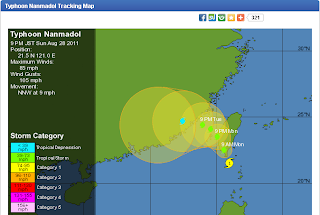 |
| Tracking Map from Weather Underground |
Having been roundly excoriated by Taiwan’s media for attending a wedding reception on the eve of Typhoon Morakot over two years ago, Ma Ying-jeou should have learned a bit about what is expected of a leader when disaster strikes. Yes, he should have learned… but then again, this is Ma Ying-jeou after all.
This glibly dismissive explanation (Ma doesn’t learn because he is Ma) may be unappealing to some readers. But as the gaffes of gaffe-prone leaders pile up, one tends to stop wondering why they can't seem to keep their hands out of the fire. If he wasn't capable of learning from his Panglossian Provence comment three weeks ago, for example, why should we expect him to have learned from his Morakot experience by the eve of Typhoon Nanmadol’s landfall in southern Taiwan?
The new gaffe to which I am referring is Ma’s decision to call a press conference on the afternoon of August 28 (TVBS article in Chinese, Taipei Times coverage in English) to roundly criticize the rejection of the “1992 Consensus” by Tsai Ying-wen, his opponent in the upcoming presidential election. The consensus, supposedly agreed to by representatives of the PRC and the ROC in 1992, claims that both governments believe that there is only one China and that both sides have their own interpretation of what that China is. Despite the fact that former KMT legislator Su Chi says he made up the term in 2000, that nobody outside of the KMT was involved in its formulation, and that no Chinese leader has ever really endorsed the “different interpretations” of the "one China, different interpretations" idea, the so-called consensus continues to be the basis of the KMTs cross-strait policymaking.
As an election tactic, Ma’s criticism of the cross-strait relations plank of Tsai’s platform makes sense. The Chinese have already firmly rejected anything but the “92 Consensus” as a basis for cross-strait relations. Therefore, Ma can legitimately claim that a "President Tsai" would not make any more headway with Beijing than he has
On the other hand, Ma’s choice of the eve of a typhoon landfall to go on the attack is really astonishing, mainly because it undermines the force of his argument by opening him to allegations of insensitivity. As DPP Spokesman Chuang Rui-hsiung responded to Ma’s press conference in a statement (see the TVBS article above):
在這節骨眼,召開記者會說,『具有高度意識型態的事』,我們不禁要問,風大雨大,難道不及九二共識大嗎?
To convene a press conference at this critical moment to talk of highly ideological matters[!] We can’t help but ask whether strong wind and rain aren’t [more important than] the 92 Consensus?
Even more astonishing is the fact that Ma apparently knew he should stay away from campaigning on this day. As the TVBS piece notes, he had already canceled his other campaign events. The press conference was a hasty afternoon affair, one that probably did not sit very well in the minds of those for whom the memory of Morakot was fresh.
Interestingly enough, TVBS, which typically supports pan-Blue politicians, seemingly strayed into the realm of sarcasm when reporting on the press conference. Although the piece avoids direct criticism, the headline says “Responding to the 92 Consensus on a Typhoon Day! (exclamation mark included). Additionally, the article reminds us twice that it is a typhoon day, while the first paragraph says Ma “persisted” in calling a press conference despite his other event cancellations, and the last paragraph seemingly chortles, “In the afternoon he cannot resist personally rising to the line of fire. Even the arrival of the fierce Typhoon Nanmadol can’t stay his determination to defend the 92 Consensus.” I doubt that this was the type of coverage Ma was hoping for.
Ma’s choice of this moment to attack Tsai was all the more bizarre since the typhoon in question was projected to affect mainly DPP-voting southwestern Taiwan, which, incidentally, was hit hard by Morakot. Faced with what could be a close election, the KMT has been trying to increase its support in that part of the country. This typhoon should present Ma with the perfect opportunity to demonstrate that he cares about the concerns of southern voters. If Nanmadol causes significant damage and the government mounts an effective response, he might still have that opportunity. However, thanks to Ma's press conference, if the damage is minimal, the South will be left with the image of an uncaring leader who couldn’t resist the urge to take up electioneering in their hour of need.
National leaders are valued for their ability to put the good of the country above their own needs. Yet, strangely enough, it seems that this realization has not yet sunk in for Ma.
No comments:
Post a Comment